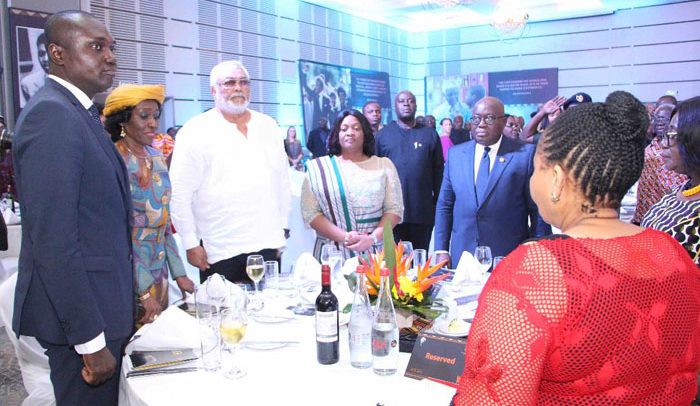President Akufo-Addo with former President Jerry Rawlings and Nana Konadu Agyeman Rawlings and other dignitaries at the Mandela centenary celebration last week
Former South African President, Nelson Mandela, is dead and gone but his memory still lives on in the hearts and minds of many people who cherished the ideas and ideals he stood for.
At the centenary anniversary celebration of his birth in Accra on Wednesday evening, President Akufo-Addo was full of praise for the man whose fight against white domination led to the apartheid regime in 1990.
In a speech, the President revealed: “President Nelson Mandela, in government, was an inspiration. He made much of being an old man, and he was 76 when he became president.”
He said that was because “his period in office was marked with dynamism and hard work. He led by example, and could point to concrete achievements.”
He quoted writer Anthony Sampson, Mandela’s official biographer, who wrote that by the end of his administration, “three million people were connected to telephone lines and safe drinking water, 1.5 million children were brought into the education system, 500 clinics were upgraded or built, two million people were connected to the electricity grid and 750,000 houses were built providing shelter for nearly three million people.”
The President stated: “These are impressive figures by any standard, and the infrastructure developments would be cited forever, but I believe the area that would demonstrate the greatest impact of Mandela would be in his style of leadership.”
He recalled how it was often said that the biggest problem with Mandela was the fact that he was too willing to see the good in other people, an accusation the man never denied, with his response being that “when you are a public figure, you have to accept the integrity of other people until there is evidence to the contrary…. I don’t want to be frightened by the fact that a person has made certain mistakes and has got human frailties. It’s a good thing to assume, to act on the basis that others are men of integrity and honour…because you tend to attract integrity and honour if that is how you regard those with whom you work.”
Conviction
President Akufo-Addo insisted: “Mandela was not a naïve man. Just as he insisted that he was not a saint, he knew that even the best of men would often succumb to the temptations of office”, with a quote from Madiba to back his claim: “History never stops to play tricks even with seasoned and world-famous freedom fighters. Frequently, erstwhile revolutionaries have easily succumbed to greed, and the tendency to divert public resources for personal enrichment ultimately overwhelmed them. By amassing vast personal wealth, and by betraying the noble objectives which made them famous, they virtually deserted the masses of the people and joined the former oppressors, who enriched themselves by mercilessly robbing the poorest of the poor.”
In other words, he insisted that “whereas he would treat everyone from the perspective that that they were men of integrity and honour, he was well aware that the best of them often succumbed to greed, and enriched themselves from public funds.”
“Having provided a solid foundation for the democratic, multi-racial society that he had fought for, he was not tempted to cling on to office and hang on to power, which has become a normal practice in Africa. He left office after one successful term as President, and marched off into a promethean sunset”, President Akufo-Addo concluded.
Recognition
During his existence, Mandela’s efforts were recognised, and he probably won more awards and laurels than anyone in history.
In addition to the 1993 Nobel Peace Prize, which he shared with F.W. de Klerk, (there were many who thought Mandela should have had that prestigious award alone), he received more than 250 major awards, comprising honorary degrees from more than 50 universities worldwide, including our own University of Ghana, Legon.
Based on these and other reasons, President Akufo-Addo stated: “We must be profoundly grateful that the United Nations took the decision to institute the Nelson Mandela International Day to be celebrated every year on July 18 – his birthday.”
By Charles Takyi-Boadu, Presidential Correspondent


